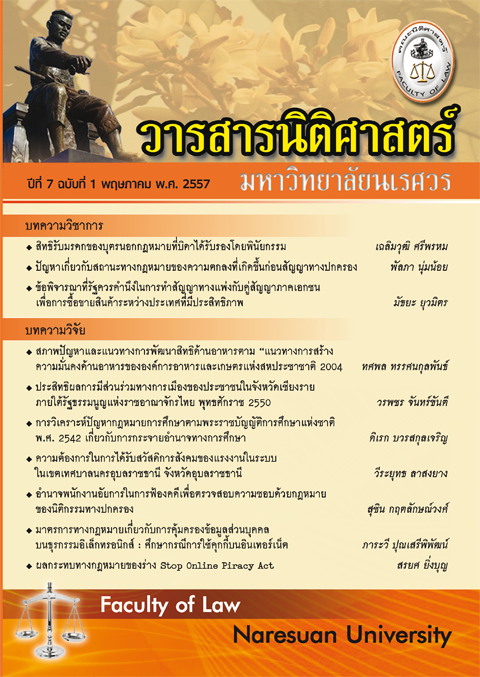Analysis of Legal Problems Arising from National Education Act B.E.2542 in Term of Educational Decentralization
Main Article Content
Abstract
This research paper aims to analyze the legal problem arising from the educational decentralization. Data sources include documents and related researches, statutes, regulations, principles and five important persons. Research tools include a record form and questionnaire, data collection, document analysis and interview with five important persons. The content analysis shows: 1) Section 1 of the Constitution of the Royal Kingdom B.E.2550 provides that Thailand is a single and indivisible kingdom. Moreover, Section 289 of the Constitution of the Royal Kingdom B.E.2550 provides the local administrative agencies with
the power of educational administration. The provision is based on the main principle of democracy that emphasizes the decentralization to the civil society. Therefore the educational decentralization is not inconsistent with the constitutional provision. Section 80(4) compels the promotion of local administrative agencies to take part in educational administration so as to ensure educational quality improvement. The educational quality should be equal and in compliance with state fundamental policies. As it is a supportive law, the interpretation should be extended to cover two possibilities: local administrative agencies able to administrate their own education directly or cooperate with other public agencies in administrate their own education. 2) The righteousness of educational decentralization is certainly assured in the legal provision. However, it is otherwise in the data interview, which raises an issue for each agency to enforce it. Section 39 of the National Education B.E.2542 provides the educational institutes with the power of administration in different arenas, which prepare the institute for future decentralization. However, the enforcement of the Act has yet to be concrete. In other words, the high–level agencies are still reserving the power, not decentralizing to low–level or practicing agencies. The National Education B.E.2542 also provides a planning and procedure of decentralization to local administrative agencies in Sections 16, 17 and 18. However the provision states the obligation of local administrative agencies, but fails to mention necessary regulations detailing the exact procedure and other related agencies’ role in decentralization. As a result, there might be a question whether the educational decentralization relates to or comply with the National Education Act B.E.2542 or not: it provides the local administrative agencies with full autonomy to establish their own educational institutes. There are two methods of decentralization of local administrative agencies. First, local administrative agencies establish their own educational institutes. Second, local administrative agencies receive the educational institutes from the Ministry of Education. However there is no legal provision to support local administrative agencies’ 0administration of the educational institutes. In conclusion, there are some loopholes in the decentralization to the local administrative agencies.
Article Details
References
กระทรวงศึกษาธิการ. พระราชบัญญัติกำหนดแผนและขั้นตอนการกระจายอำนาจให้แก่ องค์กรปกครองส่วนท้องถิ่น พ.ศ. 2542. กรุงเทพฯ: ม.ป.พ., 2542.
กระทรวงศึกษาธิการ. รายงานการศึกษาวิเคราะห์เพื่อการปฏิรูปการศึกษาตามพระราชบัญญัติการศึกษาแห่งชาติ พ.ศ. 2542 ในกรอบภารกิจของสำนักงานปฏิรูปการศึกษา เล่มที่ 4. กรุงเทพฯ: กลุ่มงานกฎหมาย, 2544.
กระทรวงศึกษาธิการ. รายงานเพื่อการปฏิรูปการศึกษา ภาคผนวก 1 ร่างพระราชบัญญัติที่จะต้องเสนอต่อรัฐสภาเพื่อตราขึ้นใช้บังคับ. กรุงเทพฯ: สำนักงานปฏิรูปการศึกษา, 2544.
กระทรวงศึกษาธิการ. รายงานเพื่อการปฏิรูปการศึกษา ภาคผนวก 2 ร่างกฎหมายลำดับรองที่จะต้องตราขึ้นใช้บังคับทันทีในระบบการศึกษาใหม่. กรุงเทพฯ: สำนักงานปฏิรูปการศึกษา, 2544.
กระทรวงศึกษาธิการ. รายงานเพื่อการปฏิรูปการศึกษา ภาคผนวก 3 รายละเอียดเกี่ยวกับโครงสร้างการจัดองค์กรและอำนาจหน้าที่ของหน่วยงานใหม่ในกระทรวงศึกษาธิการ ศาสนา และวัฒนธรรม. กรุงเทพฯ: สำนักงานปฏิรูปการศึกษา, 2544.
ปทุมมาศ ว่องสกุลชัย. “ศึกษาการวิเคราะห์ปัญหาการนำนโยบายไปปฏิบัติ ตามการกระจายอำนาจ.” ปริญญานิพนธ์การศึกษามหาบัณฑิต คณะรัฐประศาสนศาสตร์ มหาวิทยาลัยบูรพา, 2546.
ประจิม มงคลสุข. “ปัญหาทางกฎหมายในการกระจายอำนาจการบริหารงานบุคคลของ ข้าราชการครูและบุคลากรการศึกษา.” ปริญญานิพนธ์การศึกษามหาบัณฑิต คณะนิติศาสตร์ มหาวิทยาลัยศรีปทุม, 2551.
พิณสุดา สิริธรังศรี. การกระจายอำนาจการศึกษาตามพระราชบัญญัติการศึกษาแห่งชาติ พ.ศ. 2542. กรุงเทพฯ: ม.ป.พ., 2542.
พิณสุดา สิริธรังศรี. รายงานการวิจัยประกอบการร่างพระราชบัญญัติการศึกษาแห่งชาติ พ.ศ. 2542. ม.ป.ท.: ม.ป.พ., 2541.
ภัคฑิชา กาญจนนท์. “ปัญหาข้อกฎหมายเกี่ยวกับการกระจายอำนาจการจัดการศึกษาสู่องค์กรปกครองส่วนท้องถิ่น: ศึกษาเฉพาะกรณีองค์การบริหารส่วนตำบล.” ปริญญานิพนธ์ การศึกษามหาบัณฑิต คณะนิติศาสตร์ มหาวิทยาลัยรามคำแหง, 2546.
วัลลภ ลำพาย และพันธ์เทพ วิทิตอนันต์. (ความพร้อมขององค์กรปกครองส่วนท้องถิ่น เพื่อรองรับการกระจายอำนาจการศึกษาขั้นพื้นฐานจากกระทรวงศึกษาธิการ. รายงานวิจัยคณะกรรมการวิจัยและพัฒนาของวุฒิสภา สำนักงานเลขาธิการวุฒิสภา, 2549.
วิวัฒน์ แนวจันทร์. “องค์กรส่วนท้องถิ่นกับการกระจายอำนาจ.” ปริญญานิพนธ์การศึกษามหาบัณฑิต คณะนิติศาสตร์ มหาวิทยาลัยธุรกิจบัณฑิตย์, 2545.
เวลช์, ทอมัส. กระจายอำนาจทางการศึกษา: ทำไม เมื่อใด อะไร และทำอย่างไร. กรุงเทพฯ: กรมวิชาการ, 2545.
สรรค์ วรอินทร์ และทิพวัลย์ คำคง. กระจายอำนาจทางการศึกษา. กรุงเทพฯ: สำนักงานปฏิรูปการศึกษา, 2546.
สำนักงานปฏิรูปการศึกษา. การปฏิรูปการศึกษาเขตพื้นที่การศึกษาสู่การปฏิบัติ กรุงเทพฯ: พิมพ์ดี, 2544.
สำนักงานเลขาธิการวุฒิสภา. รัฐธรรมนูญแห่งราชอาณาจักรไทย. กรุงเทพ: ฝ่ายพิมพ์กองการพิมพ์, 2540.
เสริมศักดิ์ วิศาลาภรณ์.ปัญหาและแนวโน้มเกี่ยวกับการมีส่วนร่วมของประชาชนในการบริหารการศึกษา: เอกสารสัมมนาปัญหาและแนวโน้มทางการบริหารการศึกษา. นนทบุรี: มหาวิทยาลัยสุโขทัยธรรมาธิราช, 2537.
เสริมศักดิ์ วิศาลาภรณ์. การกระจายอำนาจการบริหารและการจัดการศึกษา. ม.ป.ท.: ม.ป.พ., 2541.
เสริมศักดิ์ วิศาลาภรณ์. “การกระจายอำนาจทางการศึกษา.” วารสารราชบัณฑิตยสถาน. 23, ฉ.1 (2541): 41–51.
อุทัย บุญประเสริฐ. "ข้อเสนอแนะและแนวปฏิบัติเกี่ยวกับการกระจายอำนาจการศึกษา และการถ่ายโอนสถานศึกษาขั้นพื้นฐานของไทย." วารสารวิชาการบัณฑิต. 2, ฉ.1 (2549): 83–92.
Chapman, J.D., et al. The Reconstruction of Education. London: Redwood Books Limited, 1996.
Fry, G. Wisalaporn, S. and Lertpaitoon, S. Management of Education. In Thailand: A Review and Recommendations for an Implementation Strategy for Decentralization. Photocopied.: n.p., 1999.
Lundgren, UIF P. and Mattsson, K. Decentralization by or for School Improvement, in The Reconstruction of Education. London: Redwood Bcoks Limited, 1996.
Rondinelli, D.A., Nelson, J.R. and Cheema, G.S. Decentralization in Developing Countries: a Review of Recent Experience. Washington, D.C.: World Bank, Staff Working Paper No. 581, 1984.


